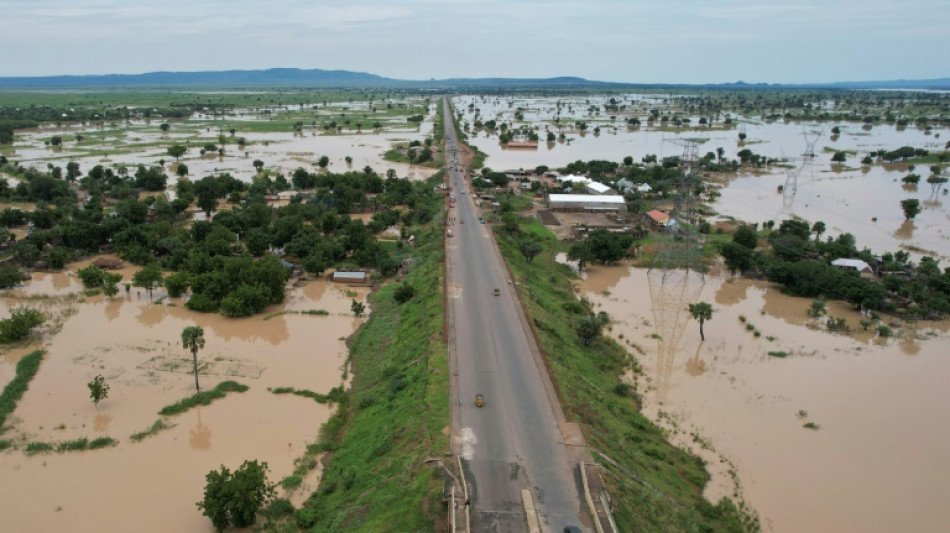
-
 Defending champion Kyren Wilson crashes out in first round of World Snooker Championship
Defending champion Kyren Wilson crashes out in first round of World Snooker Championship
-
NASA's oldest active astronaut returns to Earth on 70th birthday

-
 Exec linked to Bangkok building collapse arrested
Exec linked to Bangkok building collapse arrested
-
Zelensky says Russian attacks ongoing despite Putin's Easter truce

-
 Vaibhav Suryavanshi: the 14-year-old whose IPL dream came true
Vaibhav Suryavanshi: the 14-year-old whose IPL dream came true
-
Six drowning deaths as huge waves hit Australian coast

-
 Ukrainian soldiers' lovers kept waiting as war drags on
Ukrainian soldiers' lovers kept waiting as war drags on
-
T'Wolves dominate Lakers, Nuggets edge Clippers as NBA playoffs start

-
 Taxes on super rich and tech giants stall under Trump
Taxes on super rich and tech giants stall under Trump
-
Star Wars series 'Andor' back for final season

-
 Neighbours improvise first aid for wounded in besieged Sudan city
Neighbours improvise first aid for wounded in besieged Sudan city
-
Tariffs could lift Boeing and Airbus plane prices even higher

-
 Analysts warn US could be handing chip market to China
Analysts warn US could be handing chip market to China
-
Unbeaten Miami edge Columbus in front of big MLS crowd in Cleveland

-
 Social media helps fuel growing 'sex tourism' in Japan
Social media helps fuel growing 'sex tourism' in Japan
-
'Pandora's box': alarm bells in Indonesia over rising military role

-
 Alaalatoa hails 'hustling hard' Brumbies for rare Super Rugby clean sheet
Alaalatoa hails 'hustling hard' Brumbies for rare Super Rugby clean sheet
-
Trio share lead at tight LA Championship

-
 Sampdoria fighting relegation disaster as old heroes ride into town
Sampdoria fighting relegation disaster as old heroes ride into town
-
Recovering pope expected to delight crowds at Easter Sunday mass

-
 Nuggets edge Clippers in NBA playoff overtime thriller, Knicks and Pacers win
Nuggets edge Clippers in NBA playoff overtime thriller, Knicks and Pacers win
-
Force skipper clueless about extra-time rules in pulsating Super Rugby draw

-
 Nuggets edge Clippers in NBA playoff overtime thriller, Pacers thump Bucks
Nuggets edge Clippers in NBA playoff overtime thriller, Pacers thump Bucks
-
Unbeaten Miami edge Columbus in front of big crowd in Cleveland

-
 Kim takes one-shot lead over Thomas, Novak at RBC Heritage
Kim takes one-shot lead over Thomas, Novak at RBC Heritage
-
Another round of anti-Trump protests hits US cities

-
 'So grateful' - Dodgers star Ohtani and wife welcome first child
'So grateful' - Dodgers star Ohtani and wife welcome first child
-
PSG maintain unbeaten Ligue 1 record, Marseille back up to second

-
 US, Iran report progress in nuclear talks, will meet again
US, Iran report progress in nuclear talks, will meet again
-
US Supreme Court intervenes to block Trump deportations

-
 Hamas armed wing says fate of US-Israeli captive unknown
Hamas armed wing says fate of US-Israeli captive unknown
-
Pacers thump Bucks to open NBA playoffs

-
 Sabalenka reaches Stuttgart semis as Ostapenko extends Swiatek mastery
Sabalenka reaches Stuttgart semis as Ostapenko extends Swiatek mastery
-
Zelensky says Ukraine will observe Putin's Easter truce but claims violations

-
 'Fuming' Watkins fires Villa in bid to prove Emery wrong
'Fuming' Watkins fires Villa in bid to prove Emery wrong
-
DR Congo boat fire toll revised down to 33

-
 England thrash Scotland to set up France Grand Slam showdown
England thrash Scotland to set up France Grand Slam showdown
-
Verstappen's Red Bull 'comes alive' to claim record pole in Jeddah

-
 McTominay fires Napoli level with Inter as Conte fuels exit rumours
McTominay fires Napoli level with Inter as Conte fuels exit rumours
-
Rajasthan unleash Suryavanshi, 14, as youngest IPL player but lose thriller

-
 Man City boost top five bid, Aston Villa thrash in-form Newcastle
Man City boost top five bid, Aston Villa thrash in-form Newcastle
-
Villa rout Newcastle to rekindle bid to reach Champions League

-
 Dumornay gives Lyon lead over Arsenal in Women's Champions League semis
Dumornay gives Lyon lead over Arsenal in Women's Champions League semis
-
Trans rights supporters rally in London, Edinburgh after landmark ruling

-
 'We have to wait': Barca's Flick on Lewandowski injury fear
'We have to wait': Barca's Flick on Lewandowski injury fear
-
Bordeaux-Begles backups edge Pau to close in on Top 14 summit

-
 Trans rights supporters rally outside in London, Edinburgh after landmark ruling
Trans rights supporters rally outside in London, Edinburgh after landmark ruling
-
PSG beat Le Havre to stay on course for unbeaten Ligue 1 season

-
 Man City close in on Champions League with Everton late show
Man City close in on Champions League with Everton late show
-
14-year-old Vaibhav Suryavanshi becomes youngest IPL player


Food crisis looms in Nigeria as floods destroy crops
Usman Musa had spent more than $1,300 on his 10-hectare rice farm in Nigeria's Kogi state, now submerged by the country's worst floods in a decade.
In a wooden canoe, the 38-year-old father of four paddled his way through the murky waters, passing by his and relatives' houses, the local hospital and school.
Only the roofs were visible.
Across Africa's most populous country, communities and crops of sorghum, maize, rice and vegetables are under water, with farmers and aid workers warning of a possible food crisis.
The country, home to more than 200 million people, was already grappling with high inflation and worrying levels of food insecurity.
Now the situation will worsen, with nearly 110,000 hectares (272,000 acres) of farmland completely destroyed by flooding since August according to the latest government figures.
"Flooding is still ongoing but we can safely say that between 60 to 75 percent of the yield we expected is going to be lost," Kabir Ibrahim, president of All Farmers Association of Nigeria, told AFP this week.
"It's monumental. So many people are crying."
More than 600 people have died and 1.3 million others were forced to leave their homes according to the latest figures given by the Minister of Humanitarian Affairs Sadiya Umar Farouq.
- Risk of hunger -
Floods are not uncommon in Nigeria during the rainy season from May to November but they have been extreme this year.
Officials and residents blame climate change but also poor planning and the release of excessive water from dams, a process that is meant to ease pressure.
"If you don't open the water through the spillways, then dams will break," said Ibrahim, and then "it would be like Pakistan. All of Nigeria would be under water like Pakistan."
Farmers were warned ahead of time but it wasn't enough.
"We used the predictions and avoided planting along flood-prone areas," said Ibrahim, "but now you can see that the devastation is all over."
As a result, Ibrahim, whose organisation represents 20 million farmers, believes "there will be more hardship towards the end of the year and beginning of next year."
Food inflation year-on-year was already at 23.3 percent last month, in part because of ripple effects on the import-dependent country from the coronavirus pandemic and the Russia-Ukraine war.
Rampant insecurity with gunmen repeatedly attacking rural communities also forced many farmers to abandon their fields.
The World Food Programme and the UN's Food and Agriculture Organization (FAO) said last month that Nigeria was among six countries facing a high risk of catastrophic levels of hunger, even before the floods.
Now, "the impact of the floods on food production is a real threat to the country and could lead to a major food crisis," said Hussaini Abdu, Nigeria director of the CARE charity.
The FAO representative in Nigeria, Fred Kafeero, said he was "deeply concerned" as food supplies were expected to be low "due to anticipated reduction in household production".
The aid official said the floods were also affecting livestock and had increased the risk of vector-borne disease outbreaks such as cholera.
- Preventive measures -
The floods have not just destroyed farmlands, they have also prevented the transport of trucks and damaged roads and bridges, further pressuring the food supply.
"We were hoping inflation would get a break with the (upcoming) harvest but now with the floods, it puts a big question mark on our forecast on inflation," said Ari Aisen, the IMF's Resident Representative for Nigeria.
"It looks very serious but it's difficult to judge at this point," he told AFP, adding that while it was early to assess, "there is an upside risk for inflation, for food price increases."
The last massive floods in Nigeria in 2012 cost nearly $17 billion, according to the World Bank.
While immediate assistance is now needed, the International Monetary Fund said it would be less costly to invest in preventive measures and policies.
Countries should invest to "help populations adapt to these types (of) events rather than using resources after the fact," said Aisen.
But in the meantime, the government said it was ramping up support to affected communities.
President Muhammadu Buhari approved the release of 12,000 metric tons of assorted grains from a national strategic reserve stock.
But farmers are not sure it will be enough.
Buhari restricted the import of rice in 2015, to increase local production and self-sufficiency.
For Ibrahim, resuming those imports "should not be ruled out, if the situation becomes dire".
Weather forecast agencies have warned there could be more floods until the end of November.
J.Oliveira--AMWN